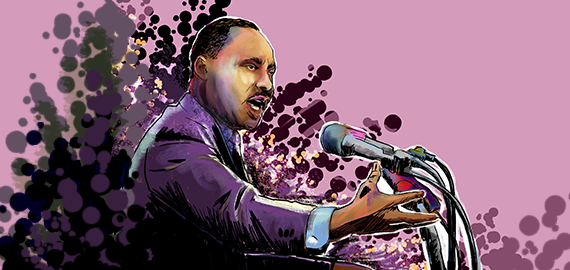Following the 2016 presidential election, I went door to door in Kalamazoo, Michigan to talk to people who lived in neighborhoods that had voted for Donald Trump, but who had previously thrown their support to Barack Obama in 2008 and 2012. In a two-hour span, myself and some 50 other activists knocked on hundreds of doors and talked about race and racism. The conversations we had were challenging. White voters confessed their deepest fears and talked about not having relationships with Black people. Their fears were based on what they saw on the news every night. Their fears were based on heightened economic anxiety mixed with untruths and blatant lies about people of color. In the eight years of the Obama presidency, it was clear, white people hadn’t grown closer to people of color.
A 52-year-old white male, who voted for Trump, started crying when he thought about his childhood and having to negotiate a relationship with his best friend, who was Black, and he had to pretend that they weren’t friends at school. He said to us, “You know, I never think about my friend any more. I live in this neighborhood where there aren’t Black people. I just don’t know any Black people anymore. I guess I am going to have to begin thinking about this when I vote.”
Swapping hard stories on door steps provided many such insightful moments regarding race and prejudice.
White door-to-door knocking volunteers where eager in theory to confront racism. But at the doors, they often struggled to tell their own stories about how they experienced racial prejudice. And when they heard stories that were blatantly racist — some activist felt shame as they too had thought similar bigoted things in the past.
But how can you be in solidarity with me, how can we heal, if you’re unable to share and confront your own stories of race and racism?
It’s really important that we have a day, like the Day of Racial Healing, where we pause, and we have conversations — like those I had in 2016 and continue to have — in which we recognize how we have harmed one another; how white supremacy plays a huge part of our lives and how it infects and affects us.
But it’s not only conversations that we need to have, it is the actions we need to take. A day of Racial Healing can’t be devoid of an analysis of who has power and how that power and privilege have allowed for our stories our pain and our suffering to have gone unheard the other 364 days. We must be bold enough to tell the truth.
Over the years, I’ve worked with thousands of people who want change. I’ve also talked to those who are the most marginalized in our society, people of color and others who have been beaten up by society, and the last thing they say they want is power. Folks who have been harmed by society do not want to replicate what they have seen other people do — they saw the way power was used against them.
But so many in power now don’t want the oppressed to vote because society is working for them — for their interest. But the antidote to this, the way to shift everything, is by building real representative political power. People of color, low-income persons, LGBT folks must be among those who go door-to-door and ask people to stand with us, to be with us on the issues that we care about. We are not alone. Every issue is solvable if we all come together.
In this moment, we need to organize, we need to vote and we need to hold our representatives accountable. If someone in office is not doing their job, we vote them out — and we vote them out together. Real political power is the inversion of the corrupt political power we’ve seen that hordes wealth, that hordes influence. The White House is our house. The Congress represents us. The Senate should too. These are our collective spaces. “We the people,” really means we the people.
The Day of Racial Healing is an on-going commitment. What do we plan to do for the next hundred days that follow today that will help to heal the racial divide? Are we honoring our racial differences in a dignified way that inspires curiosity, that inspires us to see how our stories connect us? We must find ways to meaningfully engage with each other, to open our homes to each other and to have the hard conversations. Our neighborhoods, places of worship, our workplaces and community spaces must be re-created to strengthen connections, and foster a desire to end bigotry and violence.
Blavitize your inbox! Join our daily newsletter for fresh stories and breaking news.
